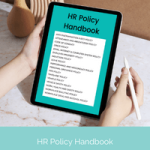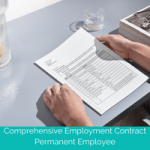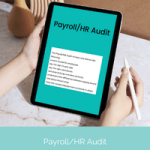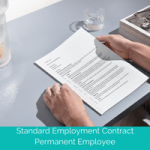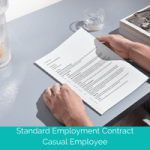I often hear the question: Do I really need HR Policies?
HR policies are an effective way to give guidance to your employees about what you expect of them, what they can expect from you, their rights and responsibilities and they can also state legislative requirements.
Even employees that are doing the right thing want to know what you expect of them. HR Policies can cover how to apply for leave, what is acceptable in relation to social media, workplace health and safety, or what an employee can and can’t wear to work.
HR policies need to be reasonable. It’s important to make sure that employees are aware of what the policy means to them, their workmates and the business. It’s important to educate your employees about your HR policies, this could be done by having a team meeting introducing new policies and then regularly talking to your employees about your HR policies at team meetings.
What HR policies should I have in my workplace?
This can depend on the size of the business and the type of work.
Here are some policies that all businesses should have:
- Code of conduct
- Leave
- Harassment & Bullying
- Attendance and Absenteeism
- Anti Discrimination & EEO
- Performance & Misconduct
- Grievance
- Social Media
- WHS
- Workplace Bullying
- Drug & Alcohol
You can also have HR policies that cover attendance and absenteeism, timesheets, induction, and company vehicle use.
Why do I need HR Policies?
Employees are given a clear indication of what is expected of them and what they can expect from their employer.
HR policies can be really useful when there is a dispute between an employer and an employee. When you can refer to a policy to show that the employee should know what his or her responsibilities are, you are more likely to be in a much stronger position before a court or tribunal.
Some employment related policies are needed to comply with legislation. For example: WHS, EEO, Harassment & Bullying.
Many HR policies aren’t regulated by law, but they’re based on standards set by the employer in relation to behaviour in the workplace.
For example, a Code of Conduct deals with employees’ behaviour at work, dress standards, punctuality, alcohol, drugs, smoking, confidentiality, other employment, swearing in the workplace and statements to media.
Social media use is another issue that’s important to give your employees guidance about. Your employees need to be clear about what they can and can’t post on social media, and even making sure they understand that it’s not OK to spend work time on social media.
Well-developed HR policies & procedures can give many benefits to the workplace. But, remember that they must be properly implemented. If your employees don’t know about the policies, they can’t be effective. Regular training should be given to ensure that your employees understand the policies. It’s a good idea to review your HR policies regularly to make sure they are still relevant to your expectations and legislation.
HR policies enable you to treat your employees fairly and equally and help protect your business from unfair dismissal or bullying claims lodged to the Fair Work Commission.
We can help you stop wasting time and money by providing expert on-demand HR services.
For further expert advice on human resources or if you have any questions about anything HR related, get in touch.
Karen Hillen is your HR Partner, she helps businesses by providing HR support and advice services.
For the right HR support and advice, book a My HR Partner HR Advice call with Karen Hillen.
https://booking.myhrpartner.com.au/15minute-hr-advice-call
https://booking.myhrpartner.com.au/30minute-hr-advice-call
My HR Partner memberships provide 24/7 access to employment contracts, HR policies and documents, and HR advice calls. These services are tailored to the member’s needs and can be accessed on demand through phone or email for performance management issues, pay rates and Award advice.
Find out more about My HR Partner HR Hub membership here:
You can also check out our HR Policy Handbook here: HR Policy Handbook

